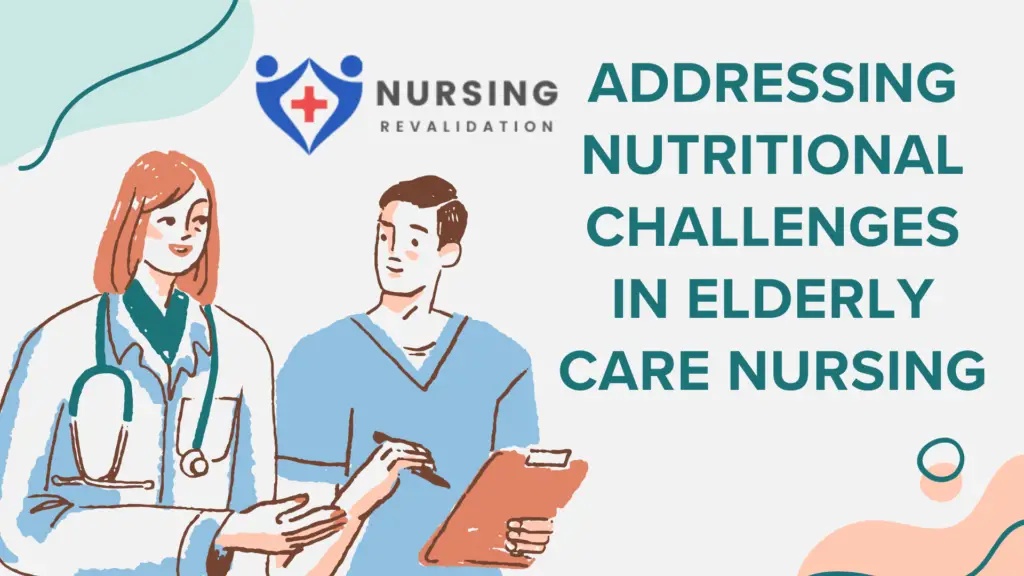Elderly care nursing presents unique challenges, particularly regarding nutrition. As individuals age, their nutritional needs change, and they may face various obstacles to maintaining a balanced diet. In this comprehensive guide, we delve into the critical nutritional challenges encountered in elderly care nursing and explore effective strategies to address them.
Understanding the Nutritional Needs of the Elderly:
Nutritional Challenges in Elderly Care Nursing:
- Decreased Appetite and Taste Changes:
- Elderly individuals often experience a decline in appetite due to various factors, including changes in taste perception and decreased sense of smell.
- Strategies: Offering smaller, more frequent meals, enhancing flavors with herbs and spices, and incorporating nutrient-dense foods can help stimulate appetite.
- Malnutrition and Undernutrition:
- Malnutrition and undernutrition are prevalent among the elderly population, leading to serious health complications.
- Strategies: Conducting regular nutritional assessments, implementing personalized meal plans, and providing oral nutritional supplements can mitigate the risk of malnutrition.
- Swallowing Difficulties (Dysphagia):
- Dysphagia, or swallowing difficulties, is common among elderly individuals and can significantly impact their ability to consume adequate nutrition.
- Strategies: Modifying food textures, utilizing assistive devices such as feeding tubes if necessary, and collaborating with speech therapists for swallowing exercises are essential for managing dysphagia.
- Chronic Health Conditions:
- Chronic health conditions such as diabetes, hypertension, and gastrointestinal disorders can complicate nutritional management in the elderly.
- Strategies: Tailoring diets to accommodate specific health conditions, monitoring blood glucose levels, and promoting hydration are crucial for managing chronic conditions effectively.
- Medication Interactions:
- Many medications commonly prescribed to the elderly population can affect appetite, nutrient absorption, and metabolism.
- Strategies: Conducting medication reviews, identifying potential interactions, and adjusting meal timing or formulations accordingly can minimize the impact of medication on nutrition.
Effective Strategies for Addressing Nutritional Challenges:
1. Individualized Nutritional Assessments:
- Conduct comprehensive nutritional assessments for each elderly patient to identify specific needs and risks.
- Utilize validated screening tools such as the Mini Nutritional Assessment (MNA) or Subjective Global Assessment (SGA) to assess nutritional status.
2. Personalized Meal Plans:
- Develop personalized meal plans tailored to each individual’s nutritional requirements, preferences, and dietary restrictions.
- Collaborate with dietitians and nutritionists to create balanced, nutrient-dense menus that meet recommended dietary allowances.
3. Oral Nutritional Supplements (ONS):
- Provide oral nutritional supplements to elderly patients who are at risk of malnutrition or unable to meet their nutritional needs through regular diet alone.
- Choose supplements that are rich in protein, vitamins, and minerals, and ensure they are palatable and easy to consume.
4. Texture Modifications:
- Modify food textures to accommodate swallowing difficulties and improve oral intake for patients with dysphagia.
- Offer pureed, minced, or soft foods as appropriate, and ensure proper positioning and supervision during meals.
5. Hydration Management:
- Monitor fluid intake closely, as dehydration is a common concern among the elderly population.
- Encourage adequate fluid intake through water, herbal teas, and hydrating foods such as fruits and vegetables.
6. Education and Support:
- Provide education and support to both elderly patients and their caregivers on the importance of nutrition and strategies for optimizing dietary intake.
- Offer resources, such as educational materials and cooking demonstrations, to empower individuals to make healthier food choices.
Conclusion:
Addressing nutritional challenges in elderly care nursing requires a multifaceted approach that encompasses personalized assessment, tailored interventions, and ongoing support. By implementing effective strategies such as individualized meal planning, oral nutritional supplementation, and texture modifications, healthcare professionals can improve the nutritional status and overall well-being of elderly patients under their care. Through collaboration, education, and innovation, we can ensure that elderly individuals receive the nutritional support they need to thrive in their later years.

